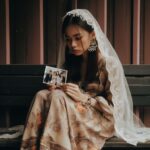
It’s not unusual to feel isolated if you or someone you know is being pressured into marriage. But you’re not alone. Still, many people do not report what is happening to them, or what they might think is happening to someone they know.
These real-life stories show that forced marriage can happen to anyone, regardless of age, gender, religion or ethnicity – and that reporting it can save lives. (The names given are not their real names.)
Aisha’s story
“I was 15 and just about to finish my GCSEs when I realised that dad was planning to send me abroad to marry my older cousin. Dad was angry all the time and sometimes hit me and my mum. Mum didn’t want me to get married so young, but she was too scared to say no to him. I thought dad might trick me into leaving the country and then take my phone off me so I couldn’t ask anyone for help.”
Aisha told a teacher at her school, who called the Forced Marriage Unit.
The Forced Marriage Unit worked with children’s social care to obtain a Forced Marriage Protection Order, which was served on Aisha’s dad. The order prevented the forced marriage from taking place as Aisha’s father was unable to take Aisha out of the country and could not apply for a passport on her behalf.
Aisha was scared to stay at home so was given a safe foster placement temporarily. Aisha’s mum worked with children’s social care and was supported in leaving Aisha’s father.
Aisha now lives safely with her mum and younger brothers and was able to finish her GCSEs.
Syed’s story
“I was 25 when my parents took me to Pakistan for a family wedding. When I got there I discovered it was me who was getting married. I did not want to but my mum has lots of health problems and everyone said I was making her ill by refusing. After days of saying no I finally gave up and submitted to my family’s will. When I got back to the UK, I just tried to forget about it and get on with my life. Then my wife’s family started pressuring me to put in a visa application for her to come to the UK. They would call me and threaten me.”
Syed called the Forced Marriage Unit at the earliest opportunity and the Forced Marriage Unit were able to explain how they could assist him as he was a reluctant sponsor.
Khadija’s story
“I used to get into trouble at home a lot, for wearing make-up or wanting to stay out late with my friends. My mum didn’t like it and we argued a lot. When I was 19, she told me we were going on holiday to visit my grandmother in Somalia. When I got there, my mum dropped me off at a boarding school and told me I had to stay there until I learned to be a good Somali daughter. She took my passport and left me there. The school was really bad. They used to beat us and told me that if I wanted to leave then I had to marry one of the guards.”
Khadija had kept a secret phone hidden. She told her boyfriend what had happened and he called the Forced Marriage Unit.
The Forced Marriage Unit worked with police in the UK to get a Forced Marriage Protection Order, which instructed Khadija’s mum to return Khadija’s passport, permit her to leave the school and book her flight back to the UK. The Forced Marriage Unit helped Khadija find short-term safe accommodation when she arrived back in the UK.
She is currently living in a refuge and receiving support from specialist professionals to rebuild her life independent from her family. (The British Embassy Mogadishu does not provide consular services. If you are in Somalia or Somaliland you can contact the British High Commission Nairobi.)
Mandeep’s story
“Last night I heard my parents talking about our trip to India this summer and their plan for my brother Mandeep to get married while we are there. My mum said they’re getting too old to look after him so thought it would be best for him to have a wife to do so. Mandeep suffers from severe learning disabilities and he is reliant on mum and dad for even the most basic tasks. I really don’t think he understands anything about being in a marriage.”
Mandeep’s sister contacted the Forced Marriage Unit to highlight her concerns about her brother’s situation and his ability to understand what was about to happen to him.
The Forced Marriage Unit made a referral to the local adult social care team explaining the situation and asked if a Mental Capacity Assessment for Mandeep could be completed, ensuring the source of information remained anonymous.
Mandeep was already receiving support from the learning disability team, but they were unaware of the upcoming marriage. Through the assessment, they found that he lacked the capacity to consent to sex and marriage.
Through the advice of the Forced Marriage Unit, a safeguarding plan was put in place, including a Forced Marriage Protection Order. The learning disability team then worked with the family to explain the risk of marriage to Mandeep and explore other options for his long-term needs.
From Forced marriage – GOV.UK (www.gov.uk) (Open Government Licence)

